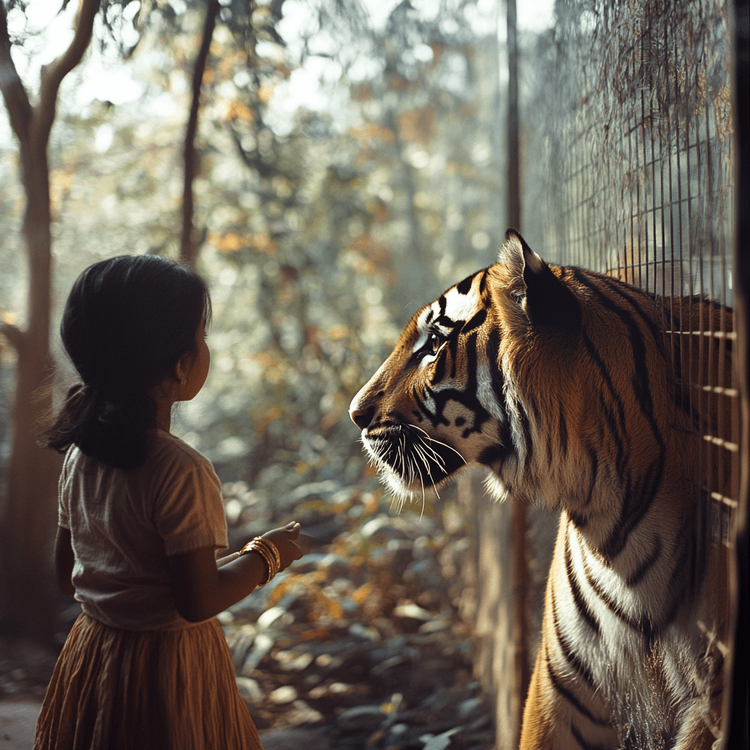Why Exotic Animals Should Not Be Kept as Pets | Risks & Ethics
Last Updated At: 11 Jul 2025
8 min read

Table of Contents
- Exotic Pets: Suited to Wild Ecosystems
- Environmental Impact of Exotic Pet Trade
- Human Safety and Legal Risks
- Ethical and Animal Welfare Considerations
- Economic and Social Dimensions of the Exotic Pet Trade
- Responsible Pet Ownership and Wildlife Conservation
- Setting Up Supportive Infrastructure for Wildlife
- Education as a Tool for Change
- Community Outreach and Awareness Campaigns
- Global Success Stories
- Long-Term Vision: Shaping Policies and Mindsets for the Futu
- Wildlife in Media: Shaping Perception Responsibly
- Strengthening International Laws and Cooperation
- Animal Rights and the Voice of the Voiceless
- Corporate and Retail Responsibility
- A Better Future Begins at Home
- Conclusion:
- FAQs
Animals like dogs, cats, rabbits, and guinea pigs have lived alongside humans for centuries. Through selective breeding, they've evolved to thrive in homes, be it apartments or suburban yards. These animals require:
Social interaction with humans
Adaptability to indoor temperatures and spaces
Diets are easily provided at home
Routine veterinary care
As a result, dog parks, litter boxes, and indoor heating systems work, allowing these pets to flourish in modern households.
Exotic Pets: Suited to Wild Ecosystems
Comparatively, exotic animals - such as tropical birds, large reptiles, or rainforest mammals- come from vastly different environments. Their needs include:
Precise humidity and temperature controls
Vast territorial spaces
Complex diets that may include live prey
Mental stimulation through hunting or social hierarchy
Veterinary expertise is rarely available
Can an exotic turtle find adequate UVB lighting? Can a sugar glider live alone without social distress? These unmet needs often lead to poor welfare.
Environmental Impact of Exotic Pet Trade
Biodiversity Threats
Many exotic species are wild-caught rather than captive-bred. When poachers extract animals from nature, they threaten public ecosystems:
Disrupted breeding patterns
Population decline
Loss of pollinators and other critical wildlife
Increased invasion of non-native species
Ecological Disasters
When exotic pets escape or are released, they often become invasive species. Florida has suffered from Burmese pythons wiping out native rodents and birds. Small islands have seen tragic declines in ecosystems after escaped rabbits or rats.
Human Safety and Legal Risks
Health Threats
Zoonotic diseases - those transmissible from animals to humans - are a major concern. Salmonella from exotic turtles, psittacosis from parrots, and Ebola from primates are just a few real threats. Homes and families become vulnerable to infections.
Physical Injuries
Exotic pets frequently act on instinct. Even seemingly tame big cats, venomous snakes, or primates can attack if stressed. Laws and anecdotal evidence support this fact:
US hospitals report rising exotic pet–related injuries
Insurance claims often refuse coverage when exotic animals cause harm
Municipal bans reflect long-term safety concerns
Ethical and Animal Welfare Considerations
The Morality of Captivity
Is it ethical to keep an animal that naturally roams hundreds of acres captive? Modern animal welfare ethics emphasize that confinement of wild animals, even with well-intentioned intent, is inherently harmful. A wild elephant in a zoo can never replicate the complexity of its natural world.
Psychological Trauma
Exotic pets lack mental stimulation in artificial environments. Boredom, anxiety, depression, and stereotypical behaviors like pacing or self-harm are common indicators. These are symptoms of suffering unseen behind closed doors.

Economic and Social Dimensions of the Exotic Pet Trade
Illegal Wildlife Trade
Though partially legal, a large portion of the exotic pet trade is illicit. Wildlife smuggling nets billions of dollars annually and is often tied to organized crime. These operations abuse wildlife and perpetuate global trafficking networks.
Community Displacement
Wildlife habitats are often in developing regions. Poaching and habitat encroachment by collectors can displace entire local ecosystems and indigenous communities, causing long-term ecological and social damage.
Responsible Pet Ownership and Wildlife Conservation
Choosing Fit Pets
Families should choose pets suited to home environments, such as:
Dogs and cats that are ethically bred
Rodents like hamsters or guinea pigs with manageable space needs
Fish in ethically maintained aquariums
These animals enjoy proper care, legal protection, and accessible vet services.
Supporting Conservation through Ethical Experiences
Instead of private ownership, consider:
Visiting wildlife sanctuaries and rescue centers
Sponsoring rescued wildlife
Adopting symbolic animals through donation programs
These support animal welfare without removing creatures from their natural ecosystems.
Setting Up Supportive Infrastructure for Wildlife
Expanding Protected Areas
Creating more national parks, biosphere reserves, and wildlife corridors allows wild animals to live freely and breed safely. Governments should prioritize land protection over exotic pet trade allowances.
Strengthening Regulation
Public authorities should:
Enforce wild-catch bans
Monitor breeding facilities
Regulate exotic pet ownership strictly
Penalize illegal trades
Ensure responsible breeding standards
Education as a Tool for Change
Impactful School Programs
Schools can foster ecology awareness and discourage exotic pet ownership by:
Teaching animal behavior and habitat needs
Encouraging wildlife writing projects
Holding guest talks from wildlife experts
Promoting empathy and humane responsibilities
Building Empathy Through Expression
At PlanetSpark, we believe creative writing gives students a voice for conservation. Our writing courses include modules on writing about animals and their habitats, encouraging empathy and activism.
Community Outreach and Awareness Campaigns
Engaging Local Communities
Animal rescues and wildlife NGOs can collaborate with local governments to run:
Pet responsibility fairs
Urban wildlife workshops
Backyard habitat creation events
Local media can amplify these efforts, debunking myths like exotic animals being easier or safer pets.
Global Success Stories
Australia: Regulated Exotic Ownership
Australia restricts exotic pet ownership to protect its unique ecosystems. These laws prevent risky species from entering and maintain native biodiversity.
Costa Rica: Ecotourism-Based Wildlife Value
By valuing wildlife as tourism assets, Costa Rica incentivizes habitat preservation over the pet trade. Tourism revenue benefits both communities and conservation.

Long-Term Vision: Shaping Policies and Mindsets for the Future
As awareness of wildlife conservation grows globally, there is a strong need to align personal choices with policy and educational reform. A sustainable future for both humans and animals depends on collective efforts.
Wildlife in Media: Shaping Perception Responsibly
Movies, social media, and TV shows often romanticize owning wild animals, like monkeys in baby clothes or tigers on leashes. These visuals fuel demand for exotic pets. Content creators and platforms must act responsibly:
Include disclaimers when using wild animals in entertainment.
Promote documentaries that showcase animals in their natural habitats.
Highlight the ethical issues surrounding exotic pet ownership.
Strengthening International Laws and Cooperation
Many animals in the exotic pet trade cross borders illegally. Hence, international collaboration is critical. The Convention on International Trade in Endangered Species (CITES) has made progress, but enforcement must improve.
Key steps governments must take include:
Banning the import/export of threatened species.
Conducting airport and port inspections for illegal wildlife smuggling.
Sharing databases between countries for tracking offenders and repeat violators.
When nations work together, enforcement becomes stronger and trade loopholes shrink.
Animal Rights and the Voice of the Voiceless
We must remember that animals cannot speak for themselves. The exotic pet trade silences the freedom, expression, and survival instincts of thousands of species. Animal rights are human responsibilities.
Children should be encouraged to think deeply about questions like:
“Would I enjoy life if I were locked in a small room forever?”
“Is my entertainment worth an animal’s suffering?”
“Can I love animals without owning them?”
Programs that promote ethical reasoning and storytelling - like those offered by PlanetSpark’s creative writing courses - help students explore these important topics through essays, debates, and personal reflections.
Corporate and Retail Responsibility
Pet shops, breeders, and online platforms often market exotic animals irresponsibly. The public should demand accountability:
Ban sales of exotic animals in retail environments.
Restrict online listings promoting illegal or unethical pet trade.
Encourage pet stores to support rescue adoption instead of exotic imports.
Some major online marketplaces have already updated their policies after public outcry. This proves that informed buyers and responsible sellers can change the narrative.
A Better Future Begins at Home
The change starts in our homes, classrooms, and communities. From choosing the right pets to raising awareness through writing, every effort adds up. You don’t have to be a scientist or policymaker to make a difference.
Conclusion:
We share our homes not just with our chosen pets, but as caretakers of animals worldwide. Confined exotic pets harm our ethics, safety, biodiversity, and legal systems. We must offer them freedom and protection in the wild or sanctuaries, not home cages.
Families should choose pets suited to domestic life, support conservation with care, and use education to foster compassion. Only then can we honor the miracle of responsible pet ownership - and ensure nature’s true stewards have a place to thrive.
FAQs
Q1: Can all exotic pets be domesticated if raised from birth?
Ans. No, many exotic species have instinctual needs (e.g., space, hunting, social structure) that homes cannot provide, leading to poor welfare and safety risks.
Q2: How does keeping exotic pets affect local ecosystems?
Ans. Escaped or released exotic pets can become invasive, outcompete native species, and disrupt ecosystems, leading to biodiversity loss and ecological imbalance.
Q3: What should I do if I see someone keeping an exotic animal illegally?
Ans. Report it to local wildlife or animal welfare authorities. If safe, share educational resources explaining the risks to both humans and wildlife.
Q4: How can parents encourage wildlife compassion in children?
Ans. Enroll them in wildlife writing or awareness programs (like PlanetSpark’s) and take them to wildlife centers or ethical sanctuaries to foster empathy and knowledge.
Personalized Communication Report
Record a video to get a AI generated personalized communication report for your child
Select Learner's Class
